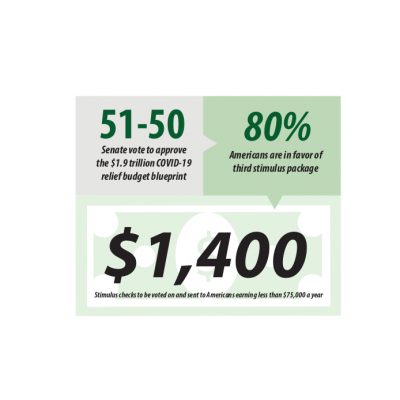President Joe Biden’s plan for the third stimulus package, called the American Recovery Act, will for the first time provide eligibility to adult dependents, allowing some Goshen College students to claim a $1,400 check through their parents.
When talking to GC students, it is clear that the stimulus money would be much appreciated.A few students, such as sophomore Wes Beck, said that they would invest it in a retirement fund.
Conrad Liechty, a first-year, said that he would save around a quarter of it, but would find ways to spend it on friends and himself over the next few months because “goodness knows we all need some of that these days.”
With Vice President Kamala Harris casting the tie-breaking vote on Feb. 5, Democrats moved forward with President Biden’s proposal, which will not need any Republican support. By using a measure called budget reconciliation, the stimulus package can pass the Senate with a majority vote, instead of the usual supermajority needed in the Senate.
Although the proposal has not garnered much Republican support in Washington, over 80% of Americans support another COVID-19 stimulus package, according to a recent CBS News poll.
The plan, as it currently stands, will send $1,400 stimulus payments to Americans earning up to $75,000 per year, or households earning up to $150,000 per year. It will allow for individuals earning up to $100,000 (or up to $200,000 for households) to be eligible for some money, although the $1,400 total will be progressively phased out for those earning more than $75,000.
However, the details are nuanced: for eligible students, the money will be added on to their parents’ checks, but if their parents do not qualify for the third check due to exceeding the income limits, the student will not receive a check either.
There is an important distinction between a dependent for tax purposes versus a dependent for the previous stimulus payments. A dependent for year-end taxes is a child who is 19 years or younger or a student 24 years or younger at the end of the calendar year. If a student meets either of these criteria, their parents likely claimed them as a dependent on their tax forms to receive a child tax credit.
However, for the first two stimulus checks, the government only allowed children under 17 to count as dependents, which added $500 for the first check and $600 for the second check to their parents’ stimulus package. This means that 17- and 18-year-old high school students who lived with their guardians, or college students under 24, were not included. Disabled adults of any age under the guardianship of their parents also fell through the cracks.
Biden’s new proposal looks to adjust the classification of a dependent to the tax definition instead of the definition for previous stimulus checks, earmarking an additional $1,400 onto parents’ checks for adult dependents.
Additionally, some older college students could qualify for a stimulus check rebate at the end of the year if they became financially independent in 2020 and their parents will not claim them as a dependent. To meet this standard, the student would have to provide more than half of their own financial support, defined as payments for food, lodging, education, medical care, and recreation.
Also, if a student is under 24 but married or has a child, they are considered independent and therefore eligible for their own stimulus check if the income requirements are met.



